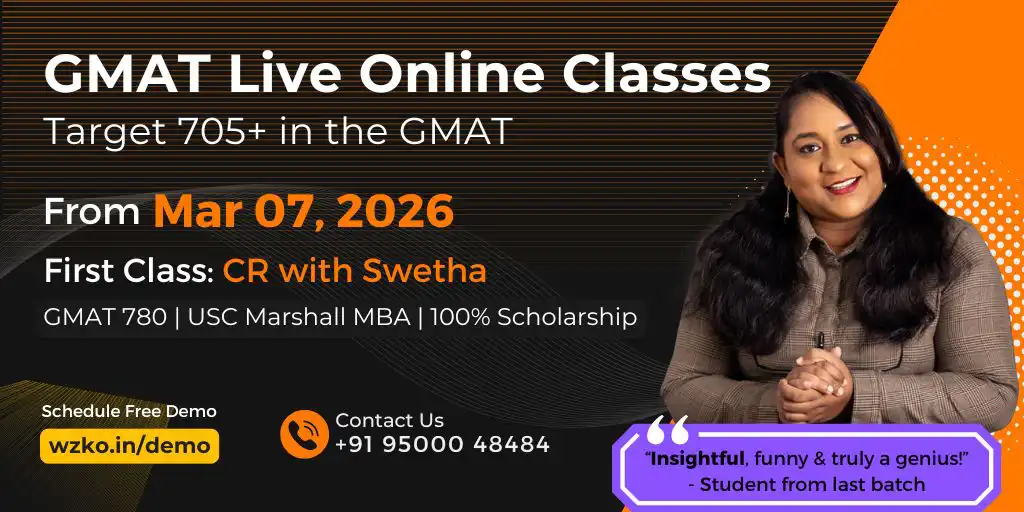
Wizako GMAT Newsletter Subscribe
Enter your email address below and subscribe to our newsletter

Enter your email address below and subscribe to our newsletter

Networking with MBA admission directors can make or break your business school application strategy. Whether you’re attending virtual events or in-person MBA fairs, knowing the right questions to ask can set you apart from hundreds of other candidates vying for the same spots.
As someone who successfully navigated the MBA admissions process with a 780 GMAT score and secured a full scholarship to USC Marshall, I’ve learned that the quality of your interactions with admission committees (ad-coms) matters more than the quantity. This guide will help you maximize every precious minute you get with these decision-makers.
This is part two of our comprehensive business school research series. In part one, we covered how to leverage school websites, FAQ pages, and placement data. Today, we’re diving deep into the art of meaningful conversations with admission directors.
Before we explore specific questions, let’s understand why this matters. When you ask the right questions, you:
However, ask the wrong questions, and you risk appearing unprepared, lazy, or just another applicant going through the motions.

Examples of questions to avoid:
Why these questions hurt your chances:
These are yes/no questions that kill conversation and show you haven’t done basic research. Every business school has an admissions requirements page that clearly states these details. When you ask these questions, you’re essentially telling the ad-com: “I couldn’t be bothered to spend 10 minutes on your website.”
The result? You’re wasting valuable interaction time and failing to make any positive impression. Worse, you might actually make a negative one.
Examples of problematic questions:
Why these questions put ad-coms in an uncomfortable position:
Admission directors are evaluators, not coaches. They can’t provide one-on-one coaching during group events, and they certainly can’t give you specific cutoff scores that don’t exist. Most schools use holistic admissions processes, meaning there’s no magic number that guarantees admission.
Asking them to review documents on the spot is particularly problematic. Imagine an ad-com standing behind a table at an MBA fair with 15 people around them and only 45 minutes left in the event. They simply don’t have the time or appropriate setting for detailed document reviews.
Now for the good stuff – questions that will make you memorable and provide valuable insights for your application.
The Formula: Brief background + specific follow-up question
Example 1: “I read about the experiential project that students do in their second term. Can you tell me more about this project and the specific opportunities that will be available?”
Example 2: “I saw that there’s been a change in [specific recent development – new dean, program restructuring, new building]. How do you think this will affect the learning experience for incoming students?”
Why this works:
Your questions should reflect both what you want to experience and how you want to contribute to the program.
Example for Diversity and Inclusion Interest: “Can you tell me more about the school’s approach to fostering an inclusive environment for all students? I’m particularly interested in learning about support systems and resources available for diverse communities, including LGBTQ+ students.”
Example for Professional Interest: “I’m interested in a career in sustainability, and I noticed the university has a sustainability center. Can you tell me more about how business school students can engage with this center? What would be the best way for me to learn more details about this offering from someone directly involved?”
Why these work:
The WRONG way: “Can you connect me to some students?”
The RIGHT way: “I’m particularly interested in [specific area/center/program]. After learning about [specific details you’ve researched], I’d love to know more. Who would you recommend I speak with to get additional insights? Perhaps someone from the [specific department/center]?”
Why the right approach works:
Instead of asking “What should I write in my essays?” (which they won’t answer), ask broader questions that provide essay material.
Example 1: “In your opinion, what qualities have made recent students particularly successful in the program? Can you share any instances of candidates who have successfully transitioned both industry and function after graduating?”
Example 2: “How do you evaluate an applicant’s potential fit with the school’s culture and values? Which of the school’s values resonate most with you personally?”
Example 3: “Are there any common mistakes or oversights you see in applications that candidates should be aware of?”
Why these questions are powerful:
Before asking these questions, research the school’s stated values and culture.
Example approach: “I’ve read about [specific school value], and it really resonates with me because [brief personal connection]. How do you see this value playing out in the day-to-day experience of students?”
Personal example: When I was researching USC Marshall, I connected with their value of “collaborative ambition.” I had researched what this meant to the school, formed my own interpretation, and then discussed with the ad-com how they interpreted it and which other values they personally aligned with. This led to a meaningful conversation that I could reference in my application.
Here’s what many candidates miss: Send a thank you email within 24 hours of every interaction with admission directors.
What to include:
Example: “Thank you for taking the time to discuss the sustainability center offerings with me yesterday. I’m the candidate who asked about connecting with the center’s director. I’d appreciate any assistance you can provide in making that connection, as I’m very interested in exploring how I can contribute to sustainability initiatives during my MBA.”
Before the event:
During the interaction:
After the event:
Remember, MBA admission directors meet hundreds of candidates each admissions cycle. Your goal isn’t just to get information – it’s to have conversations that demonstrate you’re someone they’d want in their program.
The best interactions happen when you show you’ve done your homework, ask thoughtful questions about aspects of the program that genuinely interest you, and engage in meaningful dialogue rather than just extracting information.
Your next steps:
In our next article, we’ll cover networking strategies for connecting with current students and alumni – another crucial component of your MBA research strategy.
About the Author: Swetha is a USC Marshall MBA graduate who achieved a 780 GMAT score and secured a 100% scholarship. She now helps MBA candidates through Wizako’s comprehensive GMAT preparation and Myadmit admissions guidance programs.
Ready to elevate your MBA preparation? Check out Wizako’s live online GMAT classes and self-paced programs, with free introductory content available.